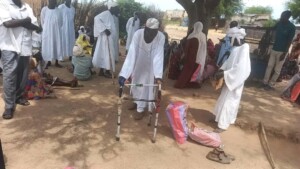Cholera in Sudan: Calls to postpone start of school year
The number of cholera deaths and new infection cases significantly increased during the Eid El Fitir holiday this week. The National Epidemiological Authority and the Democratic Teachers’ Association have called on the government to postpone the start of the new school year until the health situation in the country has improved.
The El Gedaref Minister of Health, Dr El Sadig El Wakeel, confirmed the “large increase in cases of acute water diarrhoea (AWD)” in the state on the first days of the Eid, as compared to the last week of Ramadan.
The number of cholera deaths and new infection cases significantly increased during the Eid El Fitir holiday this week. The National Epidemiological Authority and the Democratic Teachers' Association have called on the government to postpone the start of the new school year until the health situation in the country has improved.
The El Gedaref Minister of Health, Dr El Sadig El Wakeel, confirmed the “large increase in cases of acute water diarrhoea (AWD)” in the state on the first days of the Eid, as compared to the last week of Ramadan.
Sudanese newspapers quoted the minister as saying that a number of localities in El Gedaref recorded cases of AWD for the first time. He said he expects a further spread of the disease in the coming days.
Though doctors in Sudan and abroad have repeatedly appealed to the government in Khartoum to acknowledge the spread of cholera, the authorities continue to call the disease “acute watery diarrhoea”. The press and medics have been barred from mentioning the infection’s real name.
El Gedaref
“At least 15 people died of cholera in El Gedaref locality on Sunday and Monday,” a health source told Radio Dabanga.
“As for El Gedaref town, five patients died in the El Gash district, and six in El Tadamon, Kadugli, and El Geneina districts since the start of the Eid. Four people died in the countryside near El Gedaref.”
He said that cholera returned to the Umgargoura refugee camp in El Fashaga, where the isolation unit received 17 new cases of cholera on Monday.
Activist Gamar El Tahir reported to this station from the village of El Saraf El Ahmar in Eastern Galabat that the isolation unit in the area is overcrowded with cholera patients. He pointed to lack of clean water and proper sanitation, and huge swarms of flies in the area.
‘Remote area’
In the as well seriously affected White Nile state, a child died of cholera in the Eye Hospital in Kosti on Saturday.
An activist reported from Kosti that the hospital admitted 20 cases of cholera on Tuesday. “There are currently 29 cholera patients being treated at the hospital,” she told this station.
The source pointed out that between 14 and 17 cases were admitted to the Kosti Hospital between Saturday and Monday. “Yet, the White Nile state governor ordered their transferral to the isolation unit at the Kenana Technical College, that is located in a remote area where there are no laboratories, pharmacies, or other medical services.”
In North Kordofan, seven localities are affected with “watery diarrhoea”: Sheikan, Sudari, El Rahad, Umrawaba, Umhamaj Haj Ahmed, and Bara, the state Minister of Health said in a press statement on Tuesday.
He reported the death of 11 patients this week. 52 people are being treated in the isolation ward in the El Obeid Teaching Hospital.
Start of the school year
After the Eid El Fitir holiday that ends today, the schools are scheduled to open their doors again for the new school year. However, the National Epidemiological Authority (NEA) has called on the government to postpone the start of the lessons until the health situation in the country has improved.
In a statement on Tuesday, the NEA said it considers the opening of schools in the current circumstances a serious risk to the health of the students.
“Full school classes may constitute an additional factor to the spread of the epidemic, in such a way that the government will not be able to control it any more,” the NEA stated, and called on the parents to press the authorities to postpone the opening of the school year.
The Democratic Teachers' Association as well urged the Sudanese to pressure the Ministry of Education in peaceful demonstrations to postpone the opening of the schools. In a statement they said they hold the government “fully responsible for any health disaster resulting from the opening of schools”.
Follow #CholeraInSudan, # ألكوليرا_السودان for ongoing coverage by Radio Dabanga











 and then
and then